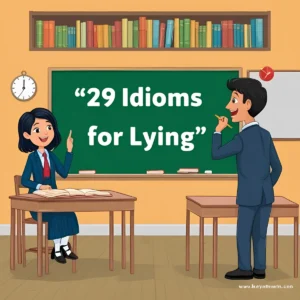Children are full of energy, curiosity, and surprises—and English idioms reflect that in fun and creative ways. From sayings like “child’s play” to “throwing the baby out with the bathwater,” these expressions capture the joys, challenges, and innocence of childhood. Idioms related to children are often used to describe simplicity, immaturity, or parenting situations in colorful language.
Learning them can make your English more expressive and engaging. In this article, we’ll explore 24 idioms related to children, complete with meanings and examples.
1. Child’s Play
Meaning: Something very easy to do.
Example: “Solving that puzzle was child’s play for her.”
Tone: Lighthearted, simple.
Other ways to say it: A piece of cake, easy as pie.
2. Throw the Baby Out with the Bathwater
Meaning: To lose something valuable while trying to get rid of something unwanted.
Example: “Don’t throw the baby out with the bathwater—just fix the problem instead of quitting altogether.”
Tone: Cautionary, wise.
Other ways to say it: Be careful, don’t overreact.
3. Like a Kid in a Candy Store
Meaning: Extremely excited about something.
Example: “When she saw the new toy collection, she was like a kid in a candy store.”
Tone: Excited, joyful.
Other ways to say it: Overjoyed, thrilled.
4. Act Like a Spoiled Brat
Meaning: Behave in an entitled or demanding way.
Example: “Stop acting like a spoiled brat and share your toys.”
Tone: Critical, reprimanding.
Other ways to say it: Being demanding, throwing a tantrum.
5. Born with a Silver Spoon in One’s Mouth
Meaning: Born into wealth and privilege.
Example: “He never had to work hard—he was born with a silver spoon in his mouth.”
Tone: Observational, slightly critical.
Other ways to say it: Privileged, wealthy background.
6. Take Candy from a Baby
Meaning: Something extremely easy to do.
Example: “Winning that game was like taking candy from a baby.”
Tone: Playful, confident.
Other ways to say it: Effortless, a walk in the park.
7. Wet Behind the Ears
Meaning: Inexperienced or naïve.
Example: “He’s still wet behind the ears when it comes to handling responsibilities.”
Tone: Encouraging, sometimes critical.
Other ways to say it: Green, new to something.
8. Cry Over Spilled Milk
Meaning: Get upset over something that can’t be changed.
Example: “It was just a small mistake—no need to cry over spilled milk.”
Tone: Reassuring, practical.
Other ways to say it: Let it go, move on.
9. Have One’s Nose in a Book
Meaning: Always reading or deeply focused on studying.
Example: “She always has her nose in a book, even during lunch.”
Tone: Appreciative, observant.
Other ways to say it: Bookworm, loves reading.
10. Fresh as a Daisy
Meaning: Full of energy and enthusiasm.
Example: “The kids woke up fresh as a daisy, ready to play.”
Tone: Cheerful, lively.
Other ways to say it: Energetic, bright-eyed.
11. Give Someone a Gold Star
Meaning: Praise or reward for a job well done.
Example: “He cleaned his room, so I gave him a gold star.”
Tone: Encouraging, rewarding.
Other ways to say it: Compliment, appreciate.
12. Get Up on the Wrong Side of the Bed
Meaning: To be in a bad mood for no clear reason.
Example: “She was grumpy all morning—must’ve gotten up on the wrong side of the bed.”
Tone: Lightly critical, humorous.
Other ways to say it: Moody, cranky.
13. Monkey See, Monkey Do
Meaning: Children imitate what they see others do.
Example: “He started copying his brother—monkey see, monkey do!”
Tone: Playful, observant.
Other ways to say it: Imitate, follow the leader.
14. Throw a Tantrum
Meaning: Have an outburst of anger or frustration.
Example: “He threw a tantrum when he didn’t get the toy he wanted.”
Tone: Disapproving, parental.
Other ways to say it: Lose one’s temper, act out.
15. A Chip Off the Old Block
Meaning: A child who closely resembles their parent in behavior or appearance.
Example: “He’s a chip off the old block—just like his father!”
Tone: Proud, affectionate.
Other ways to say it: Just like their parent, mirror image.
16. Knee-High to a Grasshopper
Meaning: Very young or small.
Example: “I’ve known her since she was knee-high to a grasshopper.”
Tone: Nostalgic, affectionate.
Other ways to say it: Very little, a tiny tot.
17. As Happy as a Clam
Meaning: Extremely happy and content.
Example: “After getting his new bike, he was as happy as a clam.”
Tone: Cheerful, playful.
Other ways to say it: Overjoyed, on cloud nine.
18. Run Around Like a Headless Chicken
Meaning: Move frantically without direction.
Example: “Before the birthday party, we were running around like headless chickens.”
Tone: Humorous, chaotic.
Other ways to say it: Rushing around, panicked.
19. Don’t Count Your Chickens Before They Hatch
Meaning: Don’t assume something will happen before it does.
Example: “He’s sure he’ll get the prize, but he shouldn’t count his chickens before they hatch.”
Tone: Wise, cautionary.
Other ways to say it: Don’t assume success too soon, wait and see.
20. Full of Beans
Meaning: Full of energy and excitement.
Example: “The kids were full of beans after eating all that candy.”
Tone: Lively, humorous.
Other ways to say it: Hyper, bursting with energy.
21. Let Sleeping Dogs Lie
Meaning: Don’t bring up past issues that could cause trouble.
Example: “There’s no need to argue again—let sleeping dogs lie.”
Tone: Wise, conflict-avoidant.
Other ways to say it: Move on, don’t stir up trouble.
22. Hit the Sack
Meaning: Go to bed.
Example: “It’s bedtime—time for you to hit the sack!”
Tone: Informal, playful.
Other ways to say it: Go to sleep, turn in for the night.
23. As Easy as ABC
Meaning: Very simple or easy to do.
Example: “Learning to ride a bike is as easy as ABC once you get the hang of it.”
Tone: Encouraging, positive.
Other ways to say it: Simple, effortless.
24. Slow and Steady Wins the Race
Meaning: Consistency and patience lead to success.
Example: “She may not be the fastest reader, but slow and steady wins the race.”
Tone: Encouraging, wise.
Other ways to say it: Keep going, persistence pays off.
Conclusion
Child-related idioms add warmth, humor, and vivid imagery to the way we speak and write. These 24 expressions help you talk about parenting, behavior, growth, and simplicity in a more natural and lively way.
Whether you’re describing something as “child’s play” or talking about someone acting “like a spoiled brat,” idioms make your language more relatable and fun. Practice them regularly to bring a fresh and familiar feel to your conversations—just like children bring joy to life.



